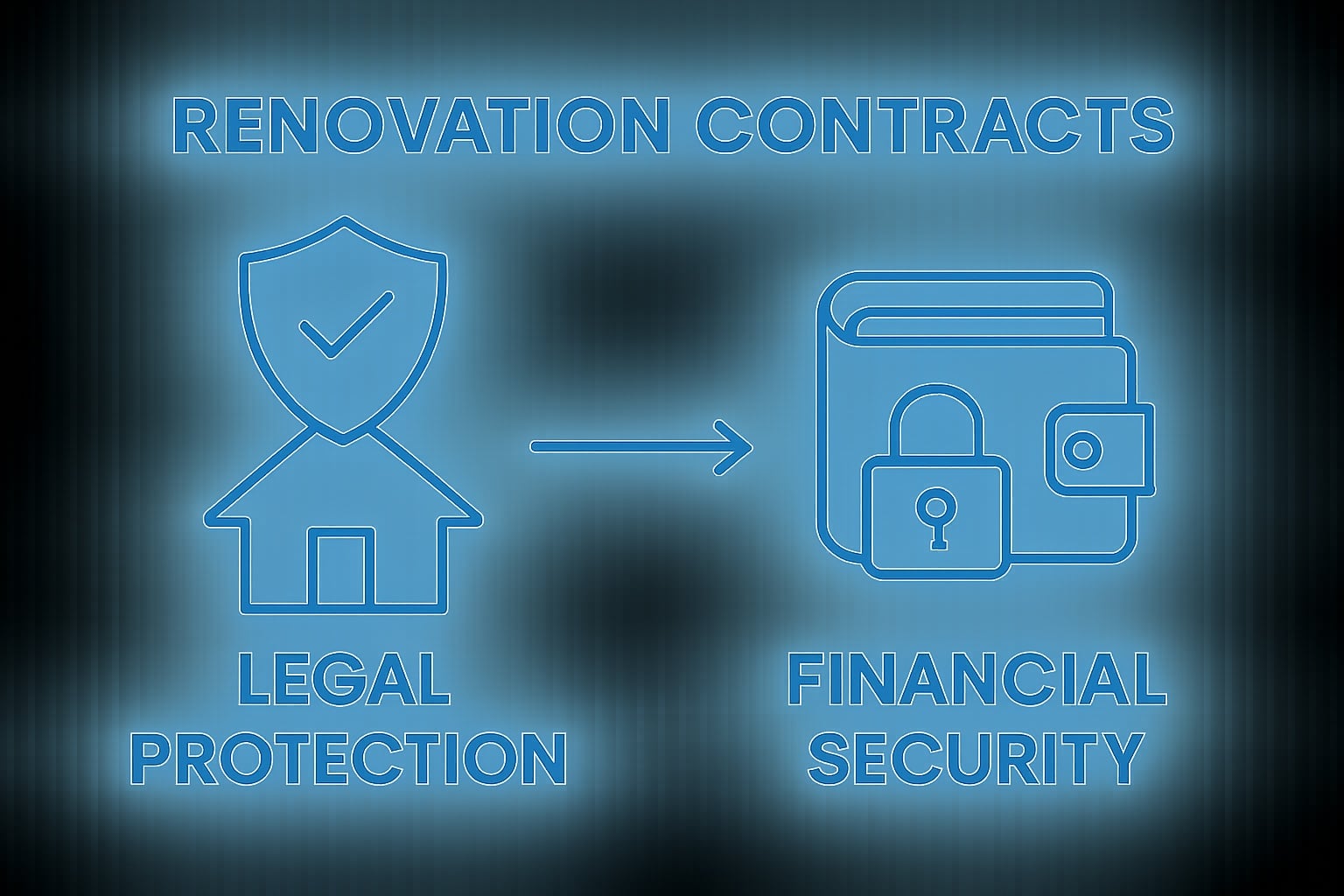- Bina Rumah Batu-Bata
- Zero Deposit
- Spesifikasi Rumah
- Lokasi Projek
- Pembiayaan LPPSA
- Garis Panduan LPPSA (Rasmi)
- Soalan Lazim LPPSA
- E-Book LPPSA (Download)
- 1. Apa itu LPPSA?
- 2. Kelebihan LPPSA
- 3. Syarat Kelayakan
- 4. Jenis-Jenis Pembiayaan
- Jenis 1 – Pembelian Rumah Kediaman Yang Telah Siap
- Jenis 2 – Membina Rumah Di Atas Tanah Sendiri
- Jenis 3 – Membeli Rumah Kediaman Yang Sedang Dibina
- Jenis 4 – Pembelian Tanah Bagi Pembinaan Rumah
- Jenis 5 – Melunaskan Keseluruhan/ Sebahagian Pinjaman Sedia Ada Daripada Bank/ Institusi Kewangan
- Jenis 6 – Pembinaan Rumah Kediaman Di Atas Tanah Yang Sedang Dibiayai Oleh BPP/ LPPSA
- Jenis 7 – Ubah Suai Rumah Yang Sedang Atau Telah Selesai Bayar Melalui LPPSA
- 5. Semak Kelayakan LPPSA
- 6. Dokumen Yang Diperlukan
- 7. Insurans/ Takaful LPPSA
- 8. Kos Yuran Guaman
- 9. BONUS: Bina Rumah
- Pembiayaan Koperasi
- Pengeluaran KWSP
- Bayaran Tunai
- Kalkulator
What is a Renovation Contract? Understanding Its Importance | RumahHQ

Homeowners often think a fresh coat of paint or new kitchen cabinets are the most important parts of a renovation. Surprisingly, the real protection comes down to paperwork and signatures. A single misstep in your contract could mean losing thousands, yet studies show that well-structured renovation contracts reduce the risk of disputes by up to 70 percent. Most people focus on design choices, but it is actually this document that holds the power to safeguard your investment and bring peace of mind to every project.
Table of Contents
Quick Summary
| Takeaway | Explanation |
|---|---|
| Renovation contracts define project scope clearly | They provide a detailed description of the renovations, materials, and specific work to be completed, reducing ambiguities. |
| Financial terms protect homeowners from surprises | Comprehensive contracts outline costs, payment schedules, and adjust mechanisms, helping prevent unexpected expenses. |
| Legal safeguards ensure contractor accountability | Contracts outline detailed responsibilities, warranties, and dispute resolution mechanisms, promoting clear expectations from the outset. |
| Incorporate timeline specifications for clarity | Expected start and completion dates, along with milestones, define the project timeline and track progress effectively. |
| Use comprehensive contracts for risk management | They function as strategic tools empowering homeowners by managing financial risks and providing legal recourse if needed. |
Defining a Renovation Contract: Key Features Explained
A renovation contract represents a legally binding agreement between property owners and contractors that outlines the specific terms, scope, and expectations for a home improvement or construction project. Unlike standard service agreements, these contracts provide comprehensive protection and clarity for both parties by establishing precise parameters for work, costs, timelines, and potential contingencies.
Understanding the Core Components
Renovation contracts are intricate documents that go beyond simple transactional paperwork. According to federal construction guidelines, they must address critical aspects of project management and performance standards. The primary features typically include:
- Detailed Project Scope: Comprehensive description of planned renovations, materials, and specific work to be completed
- Financial Terms: Exact project costs, payment schedules, and potential cost adjustment mechanisms
- Timeline Specifications: Expected start and completion dates, milestone achievements
Legal and Financial Safeguards
A well-structured renovation contract serves multiple protective functions for homeowners. It establishes clear expectations, mitigates potential disputes, and provides legal recourse if project parameters are not met.
To clarify the main legal and financial safeguarding mechanisms provided by renovation contracts, the following table organises their core protections for homeowners.
| Safeguard Type | Description |
|---|---|
| Contractor Responsibilities | Defines clear duties and obligations for the contractor to avoid misunderstandings. |
| Warranty and Guarantee | Sets terms for remedial actions and coverage of defects within a specified period. |
| Dispute Resolution | Outlines procedures for resolving conflicts, minimising the likelihood of unresolved disputes. |
| Fixed Pricing & Payments | Establishes exact costs and payment schedules, helping prevent unexpected financial burdens. |
| Contingency Clauses | Provides mechanisms to address unforeseen issues or changes during the project. |
| Legal Recourse Options | Offers steps homeowners can take if the contract terms are breached. |
| Key legal protections include: |
- Defining precise contractor responsibilities
- Outlining warranty and guarantee terms
- Establishing mechanisms for resolving potential conflicts
In the Malaysian context, our guide on transparent contracts further emphasizes the importance of clarity and comprehensive documentation. By creating a robust contractual framework, homeowners can ensure their renovation projects proceed smoothly, with minimal risk and maximum transparency.
Ultimately, a renovation contract is more than a mere administrative document – it represents a critical tool for managing expectations, protecting investments, and ensuring successful home improvement outcomes.
The Importance of Renovation Contracts for Homeowners
Renovation contracts are far more than bureaucratic paperwork. They represent a critical safeguard for homeowners, transforming complex home improvement projects from potential financial risks into structured, manageable endeavours. By establishing clear expectations and legal protections, these documents serve as essential blueprints for successful renovation experiences.
Financial Protection and Risk Mitigation
According to consumer protection guidelines, comprehensive renovation contracts provide significant financial shields for property owners. These agreements help prevent unexpected expenses and protect homeowners from potential contractor misconduct. Key financial protections include:
- Establishing fixed pricing mechanisms
- Defining exact payment schedules
- Creating mechanisms for handling unexpected project complications
- Limiting potential financial exposure
Legal Accountability and Dispute Resolution
A well-constructed renovation contract transforms verbal agreements into legally enforceable commitments. By documenting every aspect of the project, homeowners create a transparent framework that holds contractors accountable. Critical legal elements encompass:
- Detailed description of work scope
- Materials specifications
- Performance standards
- Warranty and guarantee clauses
- Mechanisms for resolving potential conflicts
In the Malaysian context, understanding design and build services becomes crucial in navigating renovation complexities. Homeowners who invest time in creating robust contracts significantly reduce their risk of project failures, budget overruns, and potential legal disputes.
Ultimately, renovation contracts are not merely administrative documents but strategic tools that empower homeowners. They transform potentially stressful home improvement projects into structured, predictable, and legally protected investments in property enhancement.
How Renovation Contracts Protect Your Investment
Renovation contracts serve as strategic financial instruments that transform home improvement projects from potential high-risk ventures into calculated, protected investments.
 These comprehensive documents go beyond simple agreements, functioning as robust safeguards that shield homeowners from financial uncertainties and potential project complications.
These comprehensive documents go beyond simple agreements, functioning as robust safeguards that shield homeowners from financial uncertainties and potential project complications.
Risk Management and Financial Control
According to urban regeneration research, effective contracts provide critical mechanisms for managing financial risks. Comprehensive renovation contracts establish multiple layers of financial protection by:
- Establishing fixed pricing frameworks
- Creating transparent cost allocation mechanisms
- Defining precise payment milestones
- Implementing contingency clauses for unexpected scenarios
Contractual Safeguards Against Project Failures
A meticulously drafted renovation contract acts as a homeowner’s primary defence against potential project derailments. Key protective elements include:
- Detailed performance standards
- Clear quality benchmarks
- Explicit timelines and completion expectations
- Mechanisms for addressing potential deficiencies
- Legal recourse options for non-compliance
Investing in quality home maintenance becomes significantly more strategic when supported by robust contractual frameworks. By implementing comprehensive contracts, homeowners transform potential renovation risks into structured, predictable investment opportunities.
Ultimately, renovation contracts represent more than legal documents. They are sophisticated risk management tools that empower homeowners to confidently navigate complex home improvement projects, ensuring financial prudence and protecting their most valuable asset – their property.
Common Components of a Renovation Contract
A comprehensive renovation contract functions as a detailed roadmap that guides the entire home improvement journey. These documents transcend mere paperwork, serving as critical instruments that establish clear expectations, protect both homeowner and contractor interests, and provide a structured framework for successful project execution.
Essential Identifying Information
According to consumer protection guidelines, the foundational layer of any renovation contract includes precise identifying details. Critical identification components encompass:
- Full legal names of homeowner and contractor
- Complete contact information for all parties
- Business registration and licensing details
- Physical addresses of both residential property and contractor’s business
- Unique contract identification number
Comprehensive Project Specifications
The heart of a renovation contract lies in its detailed project description. Key specification elements must comprehensively outline:
- Exact scope of renovation work
- Specific materials to be used
- Precise measurements and design specifications
- Quality standards and performance expectations
- Detailed architectural or design drawings
Creating a construction budget becomes significantly more manageable when contracts include granular financial breakdowns. These specifications provide transparency and prevent potential misunderstandings about project expectations.

Ultimately, a well-constructed renovation contract transforms abstract renovation concepts into concrete, actionable plans. By meticulously documenting every aspect of the project, homeowners and contractors establish a shared understanding that minimizes risks and maximizes the potential for successful project completion.
This table breaks down the essential components typically found within a comprehensive renovation contract, aiding homeowners in recognising the specific sections to review and understand.
| Component | Purpose |
|---|---|
| Identifying Information | Confirms the legal identities and contact details of all parties involved. |
| Project Scope | Describes the specific renovation tasks, materials, and boundaries of work. |
| Financial Terms | Details costs, payment schedules, and any adjustment mechanisms for financial clarity. |
| Timeline Specifications | Specifies project start and end dates, as well as important milestones. |
| Project Specifications | Lists detailed technical information—materials, design standards, and quality benchmarks. |
| Legal and Regulatory Clauses | Outlines warranty terms, dispute resolution methods, and compliance requirements. |
| Insurance and Liability Provisions | Covers contractor insurance requirements and property damage or indemnification clauses. |
Understanding the Legal Implications of Renovation Contracts
Renovation contracts represent far more than administrative documents. They are legally binding agreements that establish clear rights, responsibilities, and potential recourse for both homeowners and contractors. Understanding their legal framework is crucial for protecting investments and ensuring smooth project execution.
Contractual Rights and Obligations
Legal frameworks within renovation contracts define precise expectations and potential consequences. These agreements fundamentally establish:
- Clear performance standards and deliverables
- Explicit financial obligations
- Mechanisms for dispute resolution
- Consequences of contract breaches
- Compliance requirements with local building regulations
Liability and Risk Management
Legal implications extend beyond simple task completion. Comprehensive contracts address potential scenarios by including:
- Indemnification clauses protecting homeowners
- Insurance requirements for contractors
- Detailed specifications about workplace safety
- Provisions for handling unexpected project complications
- Mechanisms for addressing potential property damage
Choosing the right construction partner becomes critically important when understanding potential legal ramifications. A meticulously drafted contract serves as a robust legal shield, transforming potential risks into manageable, predictable scenarios.
Ultimately, renovation contracts function as sophisticated legal instruments that balance protection, transparency, and mutual understanding. By establishing clear legal parameters, these documents minimize potential conflicts and provide a structured pathway for successful home improvement projects.
Protect Your Renovation Investment with Trusted Contract Solutions
Worried about hidden costs, unclear agreements, or project delays during your renovation journey? The article above highlights how poorly defined renovation contracts can leave homeowners exposed to unnecessary financial risk and disappointment. Without a clear, transparent contract, you risk misunderstandings around project scope, payments, and legal protection. At RumahHQ, we understand the importance of strong legal documents and transparent process. Our platform streamlines every stage of your project, offering robust contracts, fixed-price packages, and comprehensive legal guidance so you avoid costly surprises.

Ready to take control of your home renovation? Explore how RumahHQ can help you with free design consultations, quality guarantees, and step-by-step contract support. Whether you’re considering your first home build or planning a significant upgrade, let us secure your investment. Visit our main page now and discover a smarter, safer way to achieve your dream home. Act today and ensure every detail of your project is protected from day one.
Frequently Asked Questions
What is a renovation contract?
A renovation contract is a legally binding agreement between property owners and contractors that outlines the specific terms, scope, and expectations for a home improvement or construction project.
Why are renovation contracts important for homeowners?
Renovation contracts protect homeowners by clearly defining project expectations, providing financial safeguards, and establishing legal accountability and recourse in case of disputes.
What are the main components of a renovation contract?
The main components of a renovation contract typically include detailed project scope, financial terms, timeline specifications, identifying information, and legal obligations.
How do renovation contracts help in risk management?
Renovation contracts help manage risks by establishing fixed pricing, detailed performance standards, and clear mechanisms for conflict resolution, which helps minimise unexpected issues during the project.
Recommended
Source link
kontraktor rumah
bina rumah
pinjaman lppsa
pengeluaran kwsp
spesifikasi rumah
rumah batu-bata
pelan rumah
rekabentuk rumah
bina rumah atas tanah sendiri
kontraktor rumah selangor
rumah banglo



